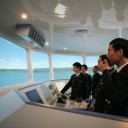Article 14
1. This Article applies to persons employed in the catering department of a vessel.
2. In the case of a passenger ship normal hours of work shall not exceed--
(a) when the vessel is at sea and on days of sailing and arrival, ten hours in any consecutive period of fourteen hours;
(b) when the vessel is in port--
(i) when passengers are on board, ten hours in any period of fourteen hours;
(ii) in other cases--
on the day preceding the weekly day of rest, five hours;
on the weekly day of rest, five hours for persons engaged in messing duties and such time not exceeding two hours as is necessary for ordinary routine and sanitary duties in the case of other persons;
on any other day, eight hours.
3. In the case of a vessel not a passenger ship, normal hours of work shall not exceed--
(a) when the vessel is at sea and on days of sailing and arrival, nine hours in any period of thirteen hours;
(b) when the vessel is in port--
on the weekly day of rest, five hours;
on the day preceding the weekly day of rest, six hours;
on any other days, eight hours in any period of twelve hours.
4. When the total number of hours worked in a period of two consecutive weeks exceeds one hundred and twelve the person concerned shall be compensated by time off in port or otherwise as may be determined by collective agreement between the organizations of shipowners and seafarers concerned.
5. National laws or regulations or collective agreements between the organizations of shipowners and seafarers concerned may make special arrangements for the regulation of the hours of work of night watchmen.
Article 15
1. This Article applies to officers and ratings employed in near and distant trade ships.
2. Time off in port should be the subject of negotiations between the organizations of shipowners and seafarers concerned on the basis that officers and ratings should receive the maximum time off in port that is practicable and that such time off should not count as leave.
Article 16
1. The competent authority may exempt from the application of this Part of this Convention officers not already excluded therefrom by virtue of Article 10, subject to the following conditions:
(a) the officers must be entitled in virtue of a collective agreement to conditions of employment which the competent authority certifies constitute full compensation for the non-application of this Part of the Convention;
(b) the collective agreement must have been originally concluded before 30 June 1946 and the agreement or a renewal thereof must be still in force.
2. A Member having recourse to the provisions of paragraph 1 shall supply to the Director-General of the International Labour Office full particulars of any such collective agreement and the Director-General shall lay a summary of the information received by him before the Committee referred to in Article 21.
3. The said Committee shall consider whether the collective agreements reported to it provide for conditions of employment which constitute full compensation for the non-application of this Part of this Convention. Each Member ratifying the Convention undertakes to give consideration to any observations or suggestions made by the Committee concerning such agreements and further undertakes to bring any such observations or suggestions to the notice of the organizations of shipowners and officers who are parties to such agreements.
Article 17
1. The rate or rates of compensation for overtime shall be prescribed by national laws or regulations or be fixed by collective agreement, but in no case shall the hourly rate of payment for overtime be less than one and a quarter times the basic pay or wages per hour.
2. Collective agreements may provide for compensation by equivalent time off duty and off the vessel in lieu of cash payment or for any other method of compensation.
Article 18
1. There shall be no consistent working of overtime.
2. Time spent in the following work shall not be included in normal hours of work or be regarded as overtime for the purpose of this Part of this Convention:
(a) work that the master deems to be necessary and urgent for the safety of the vessel, cargo or persons on board;
(b) work required by the master for the purpose of giving assistance to other vessels or persons in distress;
(c) musters, fire, lifeboat and similar drills of the kind prescribed by the International Convention for the Safety of Life at Sea for the time being in force;
(d) extra work for the purposes of customs or quarantine or other health formalities;
(e) normal and necessary work by officers for the determination of the position of the ship and for making meteorological observations;
(f) extra time required for the normal relieving of watches.
3. Nothing in this Convention shall be deemed to impair the right and duty of the master of a vessel to require, or the duty of an officer or rating to perform, any work deemed by the master to be necessary for the safe and efficient operation of the vessel.
Article 19
1. No person under the age of sixteen years shall work at night.
2. For the purpose of this Article, "night" means a period of at least nine consecutive hours between times before and after midnight to be prescribed by national laws or regulations or collective agreements.
PART IV. MANNING
Article 20
1. Every vessel to which this Convention applies shall be sufficiently and efficiently manned for the purposes of--
(a) ensuring the safety of life at sea;
(b) giving effect to the provisions of Part III of this Convention; and
(c) preventing excessive strain upon the crew and avoiding or minimising as far as practicable the working of overtime.
2. Each Member undertakes to maintain, or to satisfy itself that there is maintained, efficient machinery for the investigation and settlement of any complaint or dispute concerning the manning of a vessel.
3. Representatives of the organizations of shipowners and seafarers shall participate, with or without other persons or authorities, in the operation of such machinery.
PART V. APPLICATION OF THE CONVENTION
Article 21
1. Effect may be given to this Convention by (a) laws or regulations; (b) collective agreements between shipowners and seafarers (except as regards paragraph 2 of Article 20); or (c) a combination of laws or regulations and collective agreements between shipowners and seafarers. Except as may be otherwise provided herein, the provisions of this Convention shall be made applicable to every vessel registered in the territory of the ratifying Member and to every person engaged on any such vessel.
2. Where effect has been given to any provision of this Convention by a collective agreement in pursuance of paragraph 1 of this Article, then notwithstanding anything contained in Article 9 of this Convention the Member shall not be required to take any measures in pursuance of Article 9 of this Convention in respect of the provisions of the Convention to which effect has been so given by collective agreement.
1. This Article applies to persons employed in the catering department of a vessel.
2. In the case of a passenger ship normal hours of work shall not exceed--
(a) when the vessel is at sea and on days of sailing and arrival, ten hours in any consecutive period of fourteen hours;
(b) when the vessel is in port--
(i) when passengers are on board, ten hours in any period of fourteen hours;
(ii) in other cases--
on the day preceding the weekly day of rest, five hours;
on the weekly day of rest, five hours for persons engaged in messing duties and such time not exceeding two hours as is necessary for ordinary routine and sanitary duties in the case of other persons;
on any other day, eight hours.
3. In the case of a vessel not a passenger ship, normal hours of work shall not exceed--
(a) when the vessel is at sea and on days of sailing and arrival, nine hours in any period of thirteen hours;
(b) when the vessel is in port--
on the weekly day of rest, five hours;
on the day preceding the weekly day of rest, six hours;
on any other days, eight hours in any period of twelve hours.
4. When the total number of hours worked in a period of two consecutive weeks exceeds one hundred and twelve the person concerned shall be compensated by time off in port or otherwise as may be determined by collective agreement between the organizations of shipowners and seafarers concerned.
5. National laws or regulations or collective agreements between the organizations of shipowners and seafarers concerned may make special arrangements for the regulation of the hours of work of night watchmen.
Article 15
1. This Article applies to officers and ratings employed in near and distant trade ships.
2. Time off in port should be the subject of negotiations between the organizations of shipowners and seafarers concerned on the basis that officers and ratings should receive the maximum time off in port that is practicable and that such time off should not count as leave.
Article 16
1. The competent authority may exempt from the application of this Part of this Convention officers not already excluded therefrom by virtue of Article 10, subject to the following conditions:
(a) the officers must be entitled in virtue of a collective agreement to conditions of employment which the competent authority certifies constitute full compensation for the non-application of this Part of the Convention;
(b) the collective agreement must have been originally concluded before 30 June 1946 and the agreement or a renewal thereof must be still in force.
2. A Member having recourse to the provisions of paragraph 1 shall supply to the Director-General of the International Labour Office full particulars of any such collective agreement and the Director-General shall lay a summary of the information received by him before the Committee referred to in Article 21.
3. The said Committee shall consider whether the collective agreements reported to it provide for conditions of employment which constitute full compensation for the non-application of this Part of this Convention. Each Member ratifying the Convention undertakes to give consideration to any observations or suggestions made by the Committee concerning such agreements and further undertakes to bring any such observations or suggestions to the notice of the organizations of shipowners and officers who are parties to such agreements.
Article 17
1. The rate or rates of compensation for overtime shall be prescribed by national laws or regulations or be fixed by collective agreement, but in no case shall the hourly rate of payment for overtime be less than one and a quarter times the basic pay or wages per hour.
2. Collective agreements may provide for compensation by equivalent time off duty and off the vessel in lieu of cash payment or for any other method of compensation.
Article 18
1. There shall be no consistent working of overtime.
2. Time spent in the following work shall not be included in normal hours of work or be regarded as overtime for the purpose of this Part of this Convention:
(a) work that the master deems to be necessary and urgent for the safety of the vessel, cargo or persons on board;
(b) work required by the master for the purpose of giving assistance to other vessels or persons in distress;
(c) musters, fire, lifeboat and similar drills of the kind prescribed by the International Convention for the Safety of Life at Sea for the time being in force;
(d) extra work for the purposes of customs or quarantine or other health formalities;
(e) normal and necessary work by officers for the determination of the position of the ship and for making meteorological observations;
(f) extra time required for the normal relieving of watches.
3. Nothing in this Convention shall be deemed to impair the right and duty of the master of a vessel to require, or the duty of an officer or rating to perform, any work deemed by the master to be necessary for the safe and efficient operation of the vessel.
Article 19
1. No person under the age of sixteen years shall work at night.
2. For the purpose of this Article, "night" means a period of at least nine consecutive hours between times before and after midnight to be prescribed by national laws or regulations or collective agreements.
PART IV. MANNING
Article 20
1. Every vessel to which this Convention applies shall be sufficiently and efficiently manned for the purposes of--
(a) ensuring the safety of life at sea;
(b) giving effect to the provisions of Part III of this Convention; and
(c) preventing excessive strain upon the crew and avoiding or minimising as far as practicable the working of overtime.
2. Each Member undertakes to maintain, or to satisfy itself that there is maintained, efficient machinery for the investigation and settlement of any complaint or dispute concerning the manning of a vessel.
3. Representatives of the organizations of shipowners and seafarers shall participate, with or without other persons or authorities, in the operation of such machinery.
PART V. APPLICATION OF THE CONVENTION
Article 21
1. Effect may be given to this Convention by (a) laws or regulations; (b) collective agreements between shipowners and seafarers (except as regards paragraph 2 of Article 20); or (c) a combination of laws or regulations and collective agreements between shipowners and seafarers. Except as may be otherwise provided herein, the provisions of this Convention shall be made applicable to every vessel registered in the territory of the ratifying Member and to every person engaged on any such vessel.
2. Where effect has been given to any provision of this Convention by a collective agreement in pursuance of paragraph 1 of this Article, then notwithstanding anything contained in Article 9 of this Convention the Member shall not be required to take any measures in pursuance of Article 9 of this Convention in respect of the provisions of the Convention to which effect has been so given by collective agreement.
请登录后发帖

 联系我们人工客服
联系我们人工客服



















 :1391995811
:1391995811

